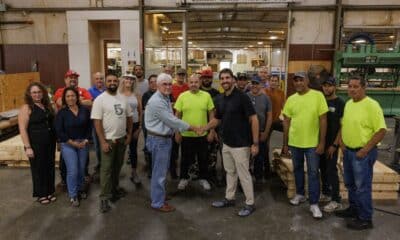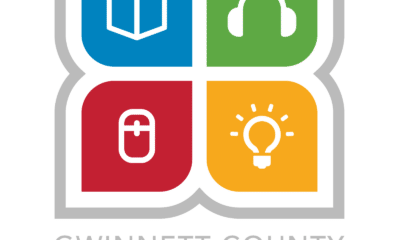City Government
Jacobs, Peachtree Corners, and Qualcomm Collaborate to Deploy Cellular Vehicle-to-Everything Technology in the City
Published
3 years agoon
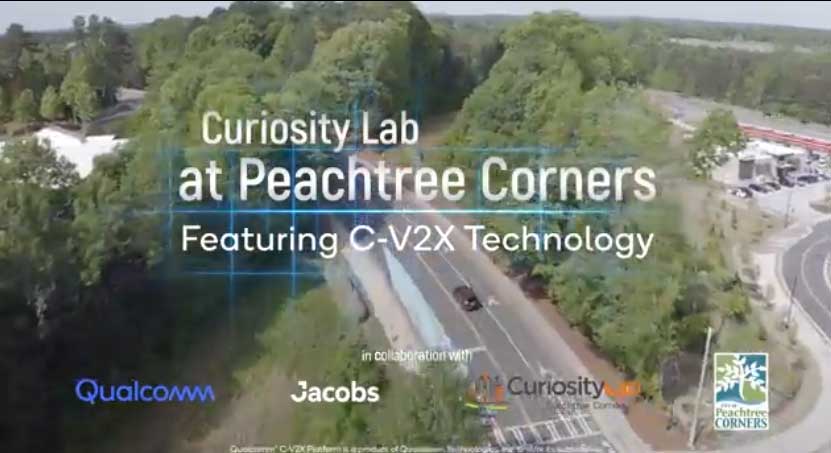
The city of Peachtree Corners and its Curiosity Lab utilize Qualcomm Technologies C-V2X solutions to enable advanced traffic efficiency and roadside safety
Jacobs, Peachtree Corners and Qualcomm Technologies, Inc. today announced joint efforts to deploy end-to-end smart solutions in one of the nation’s first smart city environments powered by real-world connected vehicle technology and infrastructure. As a part of the working relationship, Qualcomm Technologies serves as ecosystem enabler by providing technology solutions, while Jacobs manages the installation commission project delivery. The program aims to demonstrate the continued momentum of smart cities and spaces, with Peachtree Corners serving as a model for other municipalities as they look to deploy smart solutions and programs.
Peachtree Corners is home to one of the nation’s most advanced smart city ecosystems, with smart connected technologies actively being developed and deployed in real-world conditions. Its Curiosity Lab is home to technology developers and companies enabling the future, while smart connected solutions are being deployed across the community, bringing the region to the forefront in the development of next-generation, Internet of Things (IoT) technologies. Jacobs, Peachtree Corners and Qualcomm Technologies are working together to deploy the company’s technology solutions, focusing initially on roadside infrastructure, traffic management and road safety, with the implementation of Cellular Vehicle-to-Everything (C-V2X) technology. As a part of the program, the city will work with Commsignia to feature roadside units (RSUs) equipped with Qualcomm Technologies’ C-V2X solution. Utility vehicles equipped with Qualcomm Technologies’ C-V2X solutions will also be utilized to demonstrate vehicle-to-infrastructure (V2I) direct communications.
The implementation of C-V2X within the smart city environment not only demonstrates the benefits of C-V2X communications in a real-world setting at scale but showcases C-V2X’s safety critical communication capabilities needed to meet the evolving needs of transportation.
“We are pleased to be working with Jacobs and Peachtree Corners to build out a progressive smart city deployment. This implementation further exemplifies the value and leadership in the Qualcomm® Smart Cities Accelerator Program ecosystem and streamlined end-to-end deployment model capabilities,” said Sanjeet Pandit, senior director, business development and global head of Smart Cities, Qualcomm Technologies, Inc. “This C-V2X program with the Curiosity Lab and Jacobs not only highlights the ability to implement digital road infrastructure to optimize traffic and enable safer streets across global cities, but our continued commitment to offer advanced solutions for traffic safety. This project is paving the way as an example of what communities can replicate and I expect these advanced end-to-end solutions to be an integral part of future smart city and smart connected spaces rollouts.”
“In addition to procuring, installing and testing the Internet of Things infrastructure, we’re bringing planning expertise to help Peachtree Corners realize its smart city vision,” said Jacobs People & Places Solutions Senior Vice President and Regional Director Tom Meinhart. “From procurement to closeout, Jacobs and our partners work to improve safety and connectivity, while enhancing digital infrastructure and smart capabilities in the city.”
C-V2X direct communication is designed to serve as a key feature for safety and mobility applications. Additionally, C-V2X aids in enabling cleaner and sustainable mobility alternatives as the technology is expected to reduce greenhouse gas emissions between 5-20%, according to the 5GAA.
C-V2X is globally compatible with 5G networks and complements other Advanced Driver Assistance Systems (ADAS) sensors, such as cameras, radar and Light Detection and Radar (LIDAR). The C-V2X direct communications is designed to offer vehicles low latency communications for vehicles to broadcast to other vehicles, roadside infrastructure and, in the future and with further optimizations, to pedestrians and other vulnerable road users without the involvement of a cellular network, or cellular network subscription, by operating in globally harmonized 5.9 GHz ITS spectrum.
“We’re delighted to welcome Qualcomm Technologies to Peachtree Corners – reinforcing our shared leadership in bringing the smart city vision to life in the United States,” said Brandon Branham, assistant city manager and chief technology officer of Peachtree Corners. “We’ve always stressed the importance of smart connected infrastructure to support all parts of an ecosystem – from autonomous vehicles and shuttles deployed for residents, pedestrians crossing the road, smart traffic management, public safety to other areas of everyday life. Qualcomm Technologies’ industry-leading C-V2X technologies will greatly elevate our infrastructure, making it second-to-none for both technology developers and our residents as we connect more of society and business.”
Through the Qualcomm Smart Cities Accelerator Program, Qualcomm Technologies has acted as a catalyst in enabling end-to-end smart deployments and the digital transformation of smart cities and smart connected spaces globally. Peachtree Corners intends to roll out additional smart solutions in the future by collaborating with Qualcomm Technologies smart cities ecosystem and Qualcomm® IoT Services Suite verticals.
For more information on the Peachtree C-V2X project, please log onto Qualcomm C-V2X site. To schedule a briefing with city leadership, contact Peachtree@GoDRIVEN360.com.
About Jacobs
Related
City Government
Councilmember Sadd to Host Town Hall Meeting on October 29
Published
3 days agoon
October 21, 2024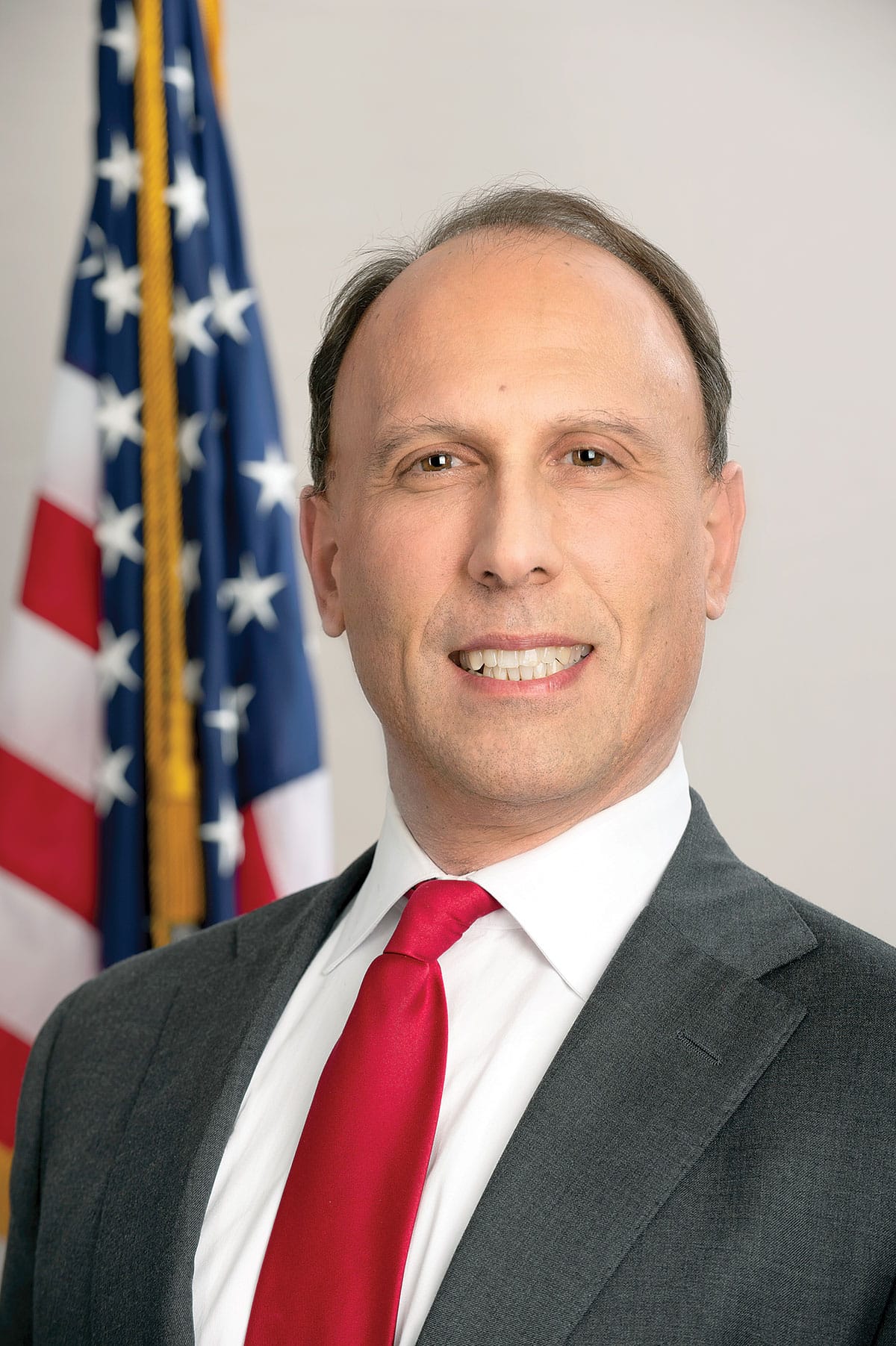
Post 1 Councilmember Phil Sadd is hosting a non-partisan town hall meeting at Winters Chapel United Methodist Church on Tuesday, October 29 at 7 p.m.
The meeting will begin with an update on activities in the City of Peachtree Corners and an overview of plans for future projects.
“The upcoming town hall will not only provide our residents with information and an opportunity to ask questions, but will also allow me to hear directly from them about their concerns and desires for the future of our city,” said Sadd.
Topics to be discussed include:
- New development/redevelopment
- Trails and parks
- Transportation improvement projects
- November 5 ballot questions
- Candidates for state and county local seats
An informative public forum
For the upcoming November 5 election, Peachtree Corners voters will have decisions to make on very important local issues. Topics on the ballot include a county-wide transit SPLOST referendum, amendments to the state constitution and the election of local state and county Officials.
“Unfortunately, there hasn’t been a public forum in Peachtree Corners during this election cycle that covers all these topics,” Sadd stated. “Every voter should have the opportunity to be informed about every item on the ballot, so they fully understand each question they need to answer and each vote they need to make.”
The Town Hall will provide information about these topics, as well as an opportunity to hear from and meet the local state (both senate and house) and county (chairman and commissioner) candidates that are on the ballot.
For more information, visit peachtreecornersga.gov.
Related
City Government
Southwest Gwinnett Mayors Share Visions for the Future
Published
3 months agoon
July 22, 2024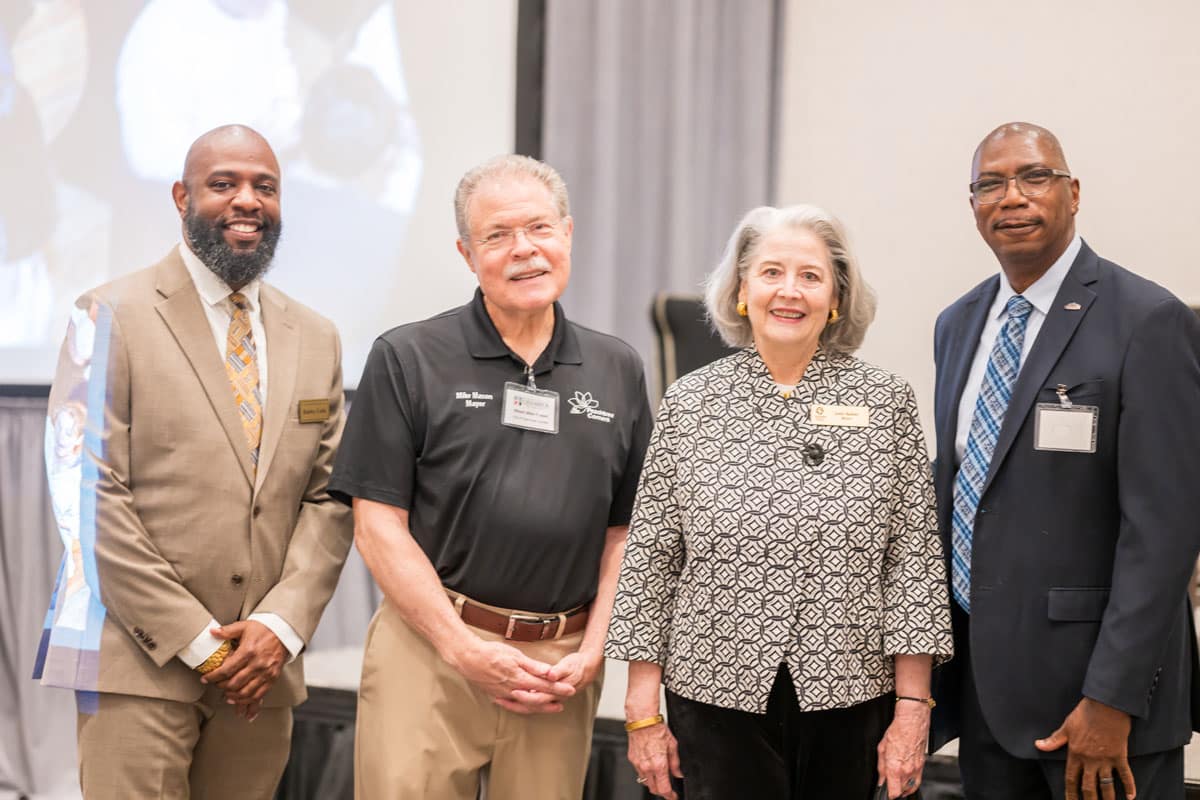
In what has now become tradition, the Southwest Gwinnett Chamber of Commerce hosted mayors from Berkeley Lake, Norcross and Peachtree Corners at a panel discussion on July 12 at the Hilton Atlanta Northeast.
The conversation centered around strategies for revitalizing and expanding metro Atlanta cities, with a focus on redevelopment, zoning ordinance reform, pedestrian and bicycle safety and investing in local schools and affordable housing initiatives.
Zoning changes
“We are beginning a really big project in our city. We have had ordinances that we’ve been working on ever since the city was incorporated in the 1950s,” said Berkeley Lake Mayor Lois Salter.
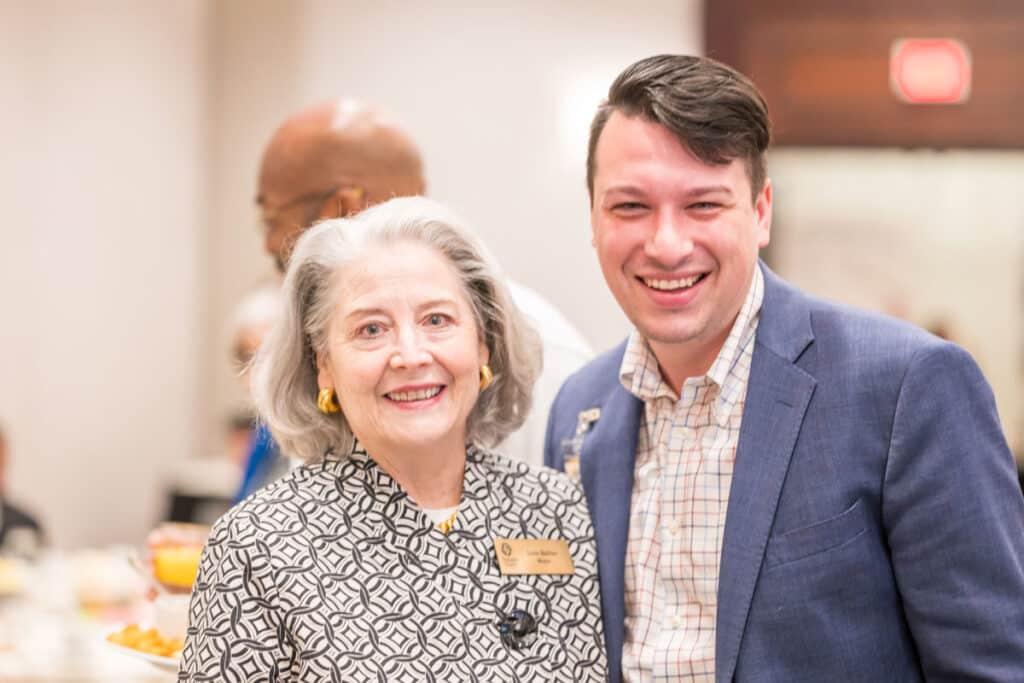
“We feel that we need to overhaul the whole zoning ordinance system and hire a consultant to come and elicit understanding and opinions from our citizens. We want them to be a part of that. We have some folks that resist any kind of regulation. They just want us to regulate their neighbors,” she added.
Norcross Mayor Craig Newton agreed that evolving needs are an important reason to change the zoning, and planning for what lies ahead is paramount. He pointed out that all Georgia cities must implement a comprehensive plan to maintain their qualified local government certifications and remain eligible for selected state funding.
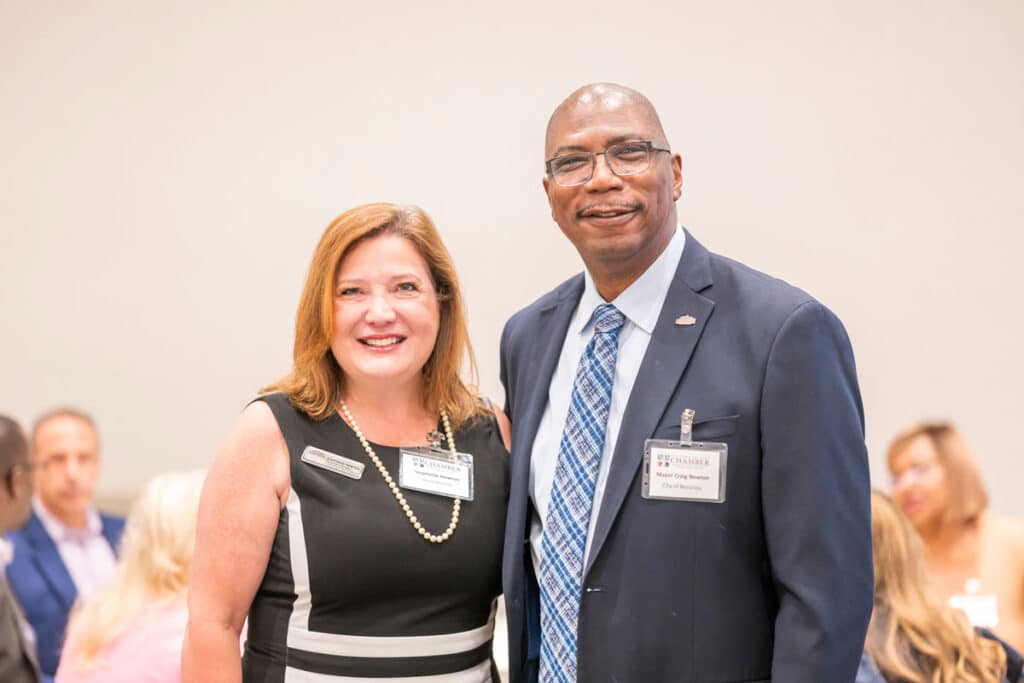
Land development
“We intend to focus on improving pedestrian bicycle safety downtown and establish a sidewalk activity improvement,” he said. “We’re also looking at approving parking in our town center and constructing the Norcross Greenway, which will bring a much-welcomed park, green space and a trail,” he added.
The county announced earlier this year that the project involves redeveloping the existing property into a park that will span almost two acres. It will offer various community spaces, including a multi-use trail, playground, covered picnic area, restroom building and a 41-space parking lot.
In addition to its amenities, a 12-foot-wide concrete trail segment will wind through the park and utility corridor, connecting Singleton Road to Dickens Road.
The trail is part of the 2018 Gwinnett Trails Countywide Trails Master Plan‘s Norcross to Lilburn Trail with an internal loop trail connecting to the neighborhood.
Commercial use
Peachtree Corners has had several “community-friendly” projects come online in the past year, but the effects of the pandemic continue to linger.
“When you think about the future, you’re thinking about the landmass and buildings and commerce. Probably the most significant issue facing a lot of us in the near term is modern office space,” said Peachtree Corners Mayor Mike Mason. “There’s a lot of space. The question is, are people going to come back?”
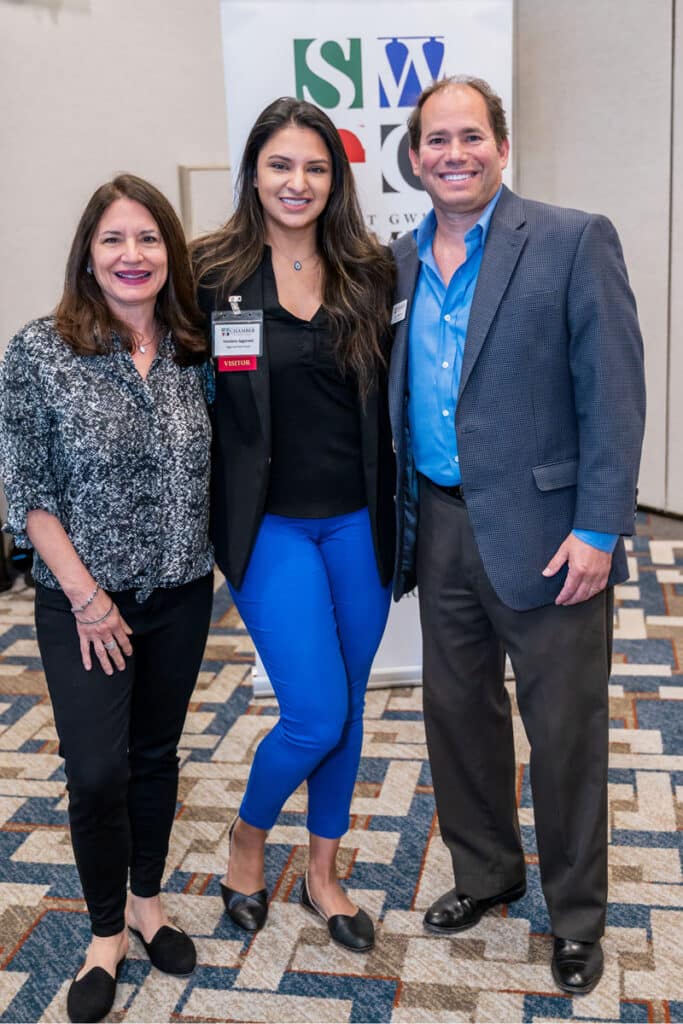
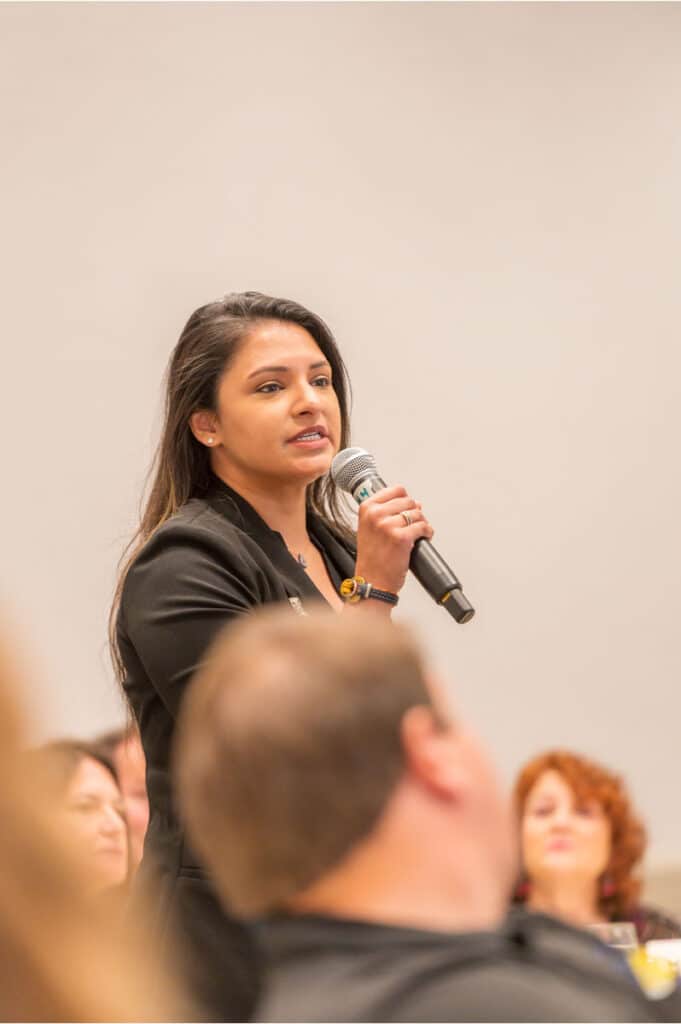
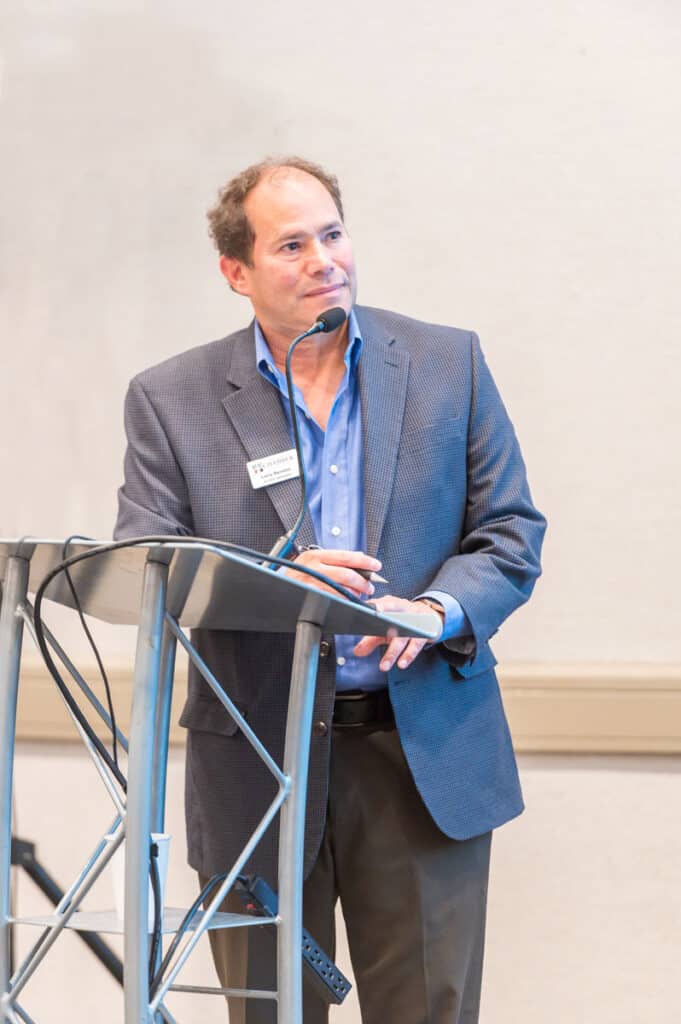
He said that the central retail area has shifted with the revitalization of The Forum and that’s making city leaders rethink city planning.
“We’re having a look at our code and things like that. But from another point of view that will drive the decision about what communities are going to look like,” he said. “For example, there are people coming into the city that say some buildings are technologically obsolete.”
Public safety
Even though Berkeley Lake is the smallest of the three cities and has the highest average home values, all the mayors agreed that public safety is a growing concern.
“Living in Norcross offers residents a dense suburban feel that’s somewhat rural compared to the city of Atlanta,” said Newton. “But some of our public safety initiatives are increasing police presence in high crime areas.”
As the only one of the three cities with a full police department, Norcross is seeking creative ways to implement effective community policing strategies to build trust and communication between law enforcement and the residents.
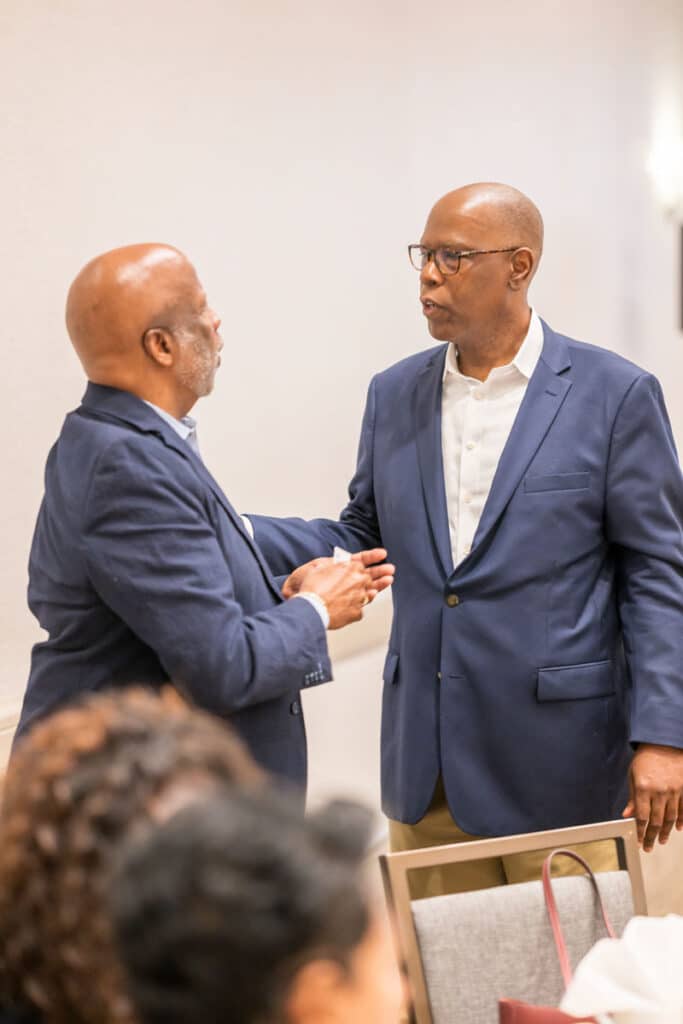
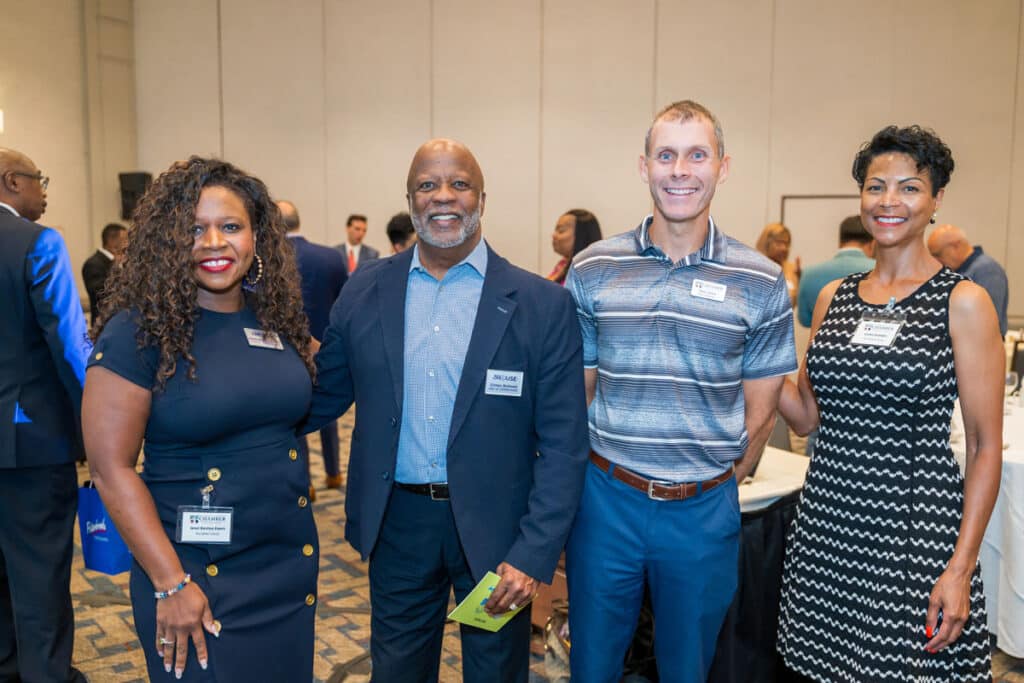
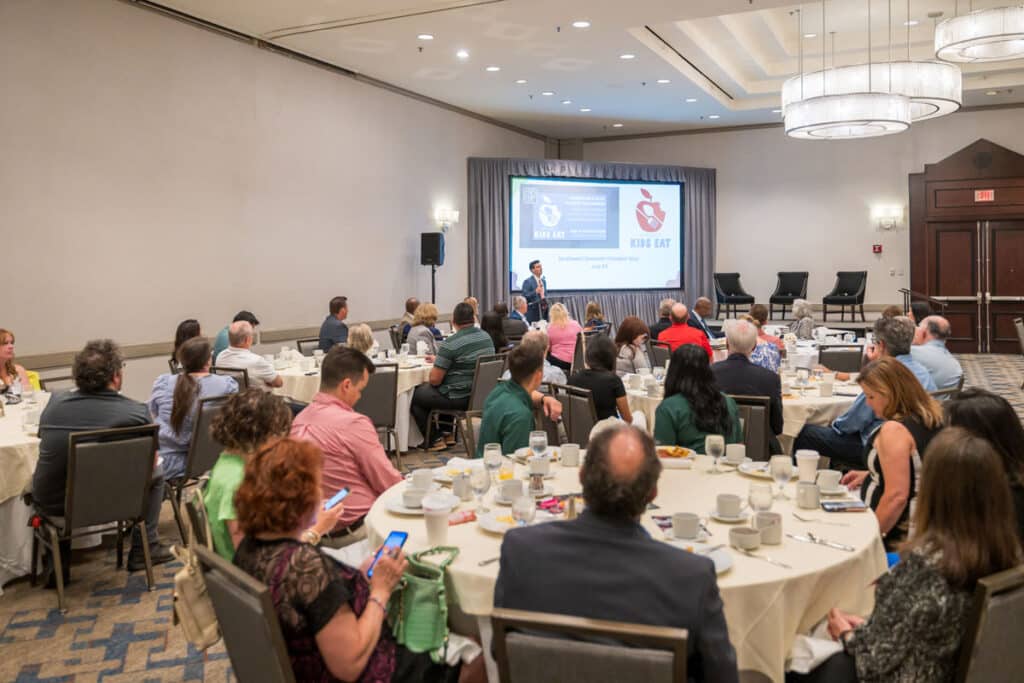
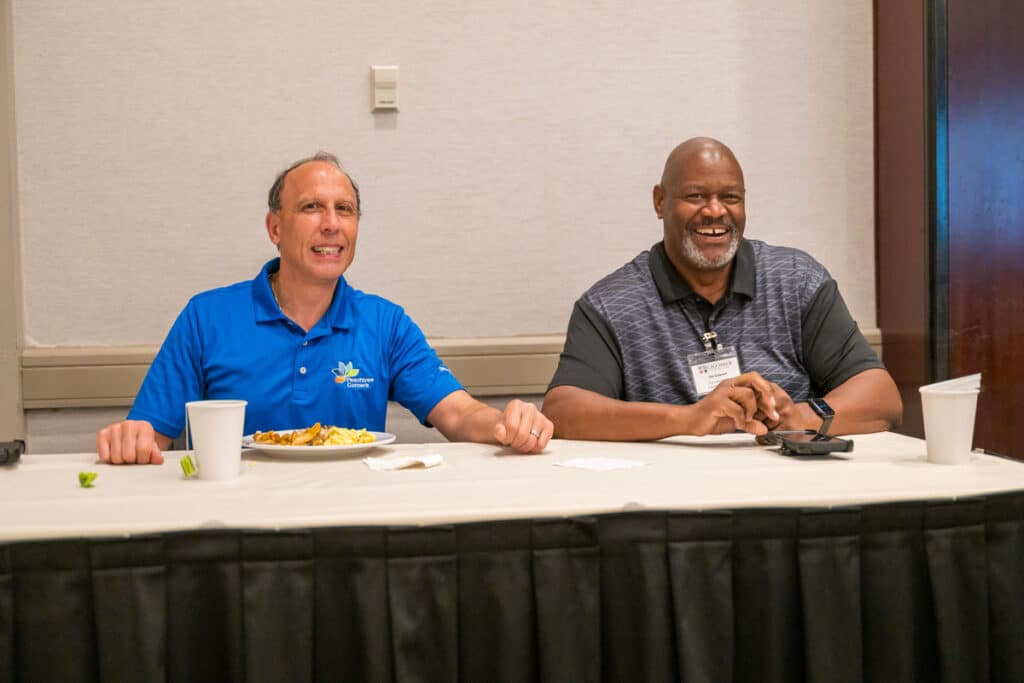
Newton mentioned programs such as Neighborhood Watch, youth outreach programs and educational initiatives along with enhancing emergency response capabilities with training for the local fire department and EMS services.
“Our response time goal is for an officer to be on-site in an emergency within 30 minutes,” he said. “But that doesn’t happen.”
Extended-stay hotels tend to attract crime, so Newton said the city has worked with owners to improve lighting in the public spaces to deter criminal activity.
“We’ve partnered with nonprofit businesses and local stakeholders to support social services employment opportunities for at-risk individuals,” he said. “By working together with various organizations and entities were able to address the complex challenge of public safety.”
Community accountability
With no police force, Berkeley Lake relies heavily on cameras and old-fashioned “knowing your neighbors,” said Salter.
“Some of our individual HOAs are buying and furnishing and paying for cameras to safeguard their neighborhoods,” she said.
Although there may be pockets of criminal behavior around the city, Salter said a police officer once described Berkeley Lake as a “black hole” of crime because there’s so little crime data.
“One of the reasons for that we feel is that historically we’ve been a very neighborly people,” she said. “There is an amazing system of community cohesiveness.”
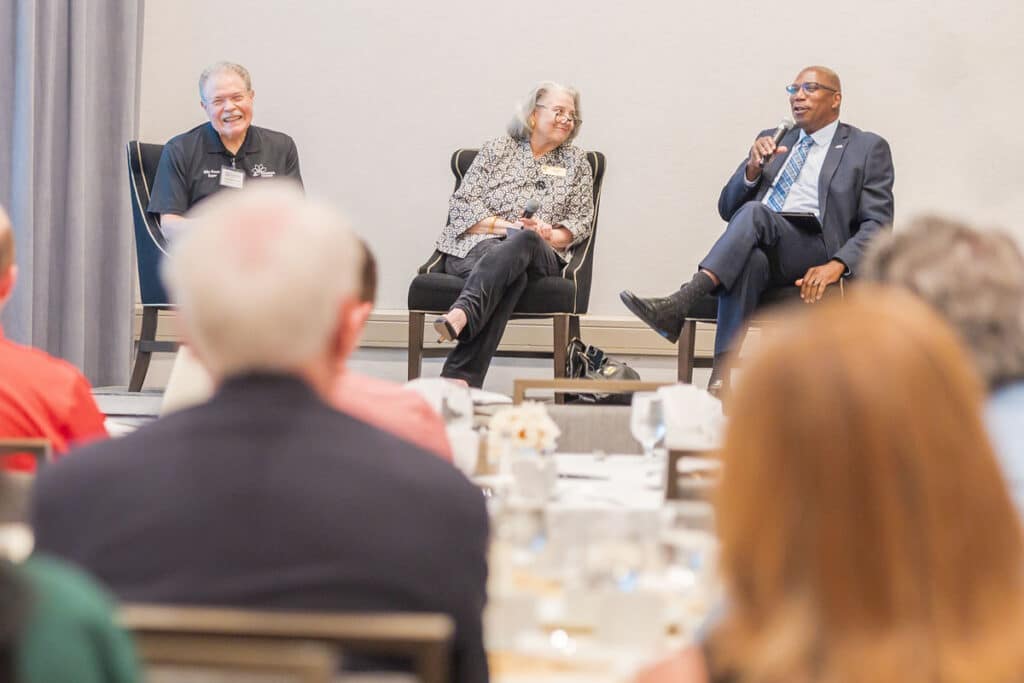
Peachtree Corners is taking its own approach.
“We’ve recently added a Marshal Service and as Lois mentioned we’re also leaning on technology,” said Mason.
The marshal department doesn’t take the place of the services provided by Gwinnett County Police, it primarily enforces city code and aids Gwinnett PD when necessary.
“We’re utilizing as much technology as we can,” said Mason.
Gwinnett PD is instructing where to locate cameras and the city keeps adding them. There have been several instances in the last year or so where coordination among agencies and the use of technology have thwarted or caught criminals.
At the end of the day, the three mayors said the cities all rely on each other. Being so close means that economic development, enhanced entertainment and other desirable amenities are boons for them all.
Related
City Government
Planning and Development is Changing in Peachtree Corners
Published
5 months agoon
June 6, 2024
From Peachtree Corners Mayor Mike Mason’s monthly column.
After the COVID-19 pandemic, the city noticed a development trend that focused on the importance of social interaction. It began seeing development applications for indoor pickleball, virtual racing, garden clubs, car clubs and other recreational uses.
When our city was established in 2012, it adopted Gwinnett County’s codes and ordinances to maintain consistency and these new social interaction-focused uses were not initially considered in the city’s current Comp Plan or zoning code.
Working from home is another market trend having a big impact on local office parks. This economic engine is driven by office parks such as Technology Park and there’s always been a priority placed on preserving office stock.
Even though the commercial office market is waning right now, that pendulum is still trying to figure out where it will settle in. Most of these new socially focused uses find the best home in an office setting.
Due to the increasing number of these applications and the evolving market trends, the city has imposed a six-month moratorium on projects in the Central Business District character area. The moratorium came into effect on May 3 and will end on November 3.
This halt will allow the city six months to pause rezoning applications, special use permits and variances applications for residential or mixed-use development. It will help the city maintain the status quo, stop new applications from coming in and allow for officials to consult with experts and delve deeper into the code and comprehensive plans.
The city plans to conduct extensive research, analysis and strategic planning during this period to help determine if any changes should be made to the comprehensive plan and zoning regulations.
For instance, it might be beneficial to designate downtown as a distinct character area separate from the central business district. Implementing new zoning regulations to transform it into an entertainment district or a unique downtown character area could be a viable option. Many cities have already adopted this type of zoning.
Office parks and businesses throughout the city provide a balance of jobs and residents that allow the city to be the second largest in the state with a zero-millage rate or no city property tax.
Therefore, as part of this process the city will research ways it can preserve, stabilize and enhance the economic engine through the activation of underutilized spaces within office parks.
This proactive approach will help maintain the job-to-resident balance that allows the zero-millage rate while positioning the city for success as the office market pendulum settles.
The most important thing this moratorium does is allow the city to consider what will work best for Peachtree Corners. Furthermore, it communicates to developers that the city requires a pause because current zoning regulations and comprehensive plan do not adequately address future goals.
Related
Read the Digital Edition
Subscribe
Keep Up With Peachtree Corners News
Join our mailing list to receive the latest news and updates from our team.
You have Successfully Subscribed!

TransPak Acquires Reid Packaging to Expand East Coast Presence

Peachtree Corners City Leaders Engage Residents on Land Use Development

The NOW Massage Opens Peachtree Corners Boutique at The Forum

GCPL Accepting Applications for Next New Start Entrepreneurship Incubator

Ruwa Romman’s Re-Election Bid: Addressing Housing, Taxes and Transportation in Gwinnett [Podcast]

Councilmember Sadd to Host Town Hall Meeting on October 29

PTC Arts Inc. Furthers Mission to Provide Accessible Art

From Corporate to Sci-Fi Author: Jill Tew Discusses ‘The Dividing Sky’ [Podcast]

From Corporate to Sci-Fi Author: Jill Tew Discusses ‘The Dividing Sky’ [Podcast]

PTC Arts Inc. Furthers Mission to Provide Accessible Art

Councilmember Sadd to Host Town Hall Meeting on October 29

Ruwa Romman’s Re-Election Bid: Addressing Housing, Taxes and Transportation in Gwinnett [Podcast]

GCPL Accepting Applications for Next New Start Entrepreneurship Incubator

TransPak Acquires Reid Packaging to Expand East Coast Presence

The NOW Massage Opens Peachtree Corners Boutique at The Forum

Peachtree Corners City Leaders Engage Residents on Land Use Development

Light up the Corners [Video]

Capitalist Sage: Business Leadership in Your Community [Podcast]

Cliff Bramble: A Culinary Adventure through Italy

Top 10 Brunch Places in Gwinnett County

A Hunger for Hospitality

THE CORNERS EPISODE 3 – BLAXICAN PART 1

Top 10 Indoor Things To Do This Winter

The ED Hour: What it takes to Remove Barriers from Education

Peachtree Corners Life
Topics and Categories
Trending
-
Business1 week ago
TransPak Acquires Reid Packaging to Expand East Coast Presence
-
Health & Wellness1 week ago
The NOW Massage Opens Peachtree Corners Boutique at The Forum
-
Community5 days ago
GCPL Accepting Applications for Next New Start Entrepreneurship Incubator
-
Peachtree Corners Life4 days ago
Ruwa Romman’s Re-Election Bid: Addressing Housing, Taxes and Transportation in Gwinnett [Podcast]





